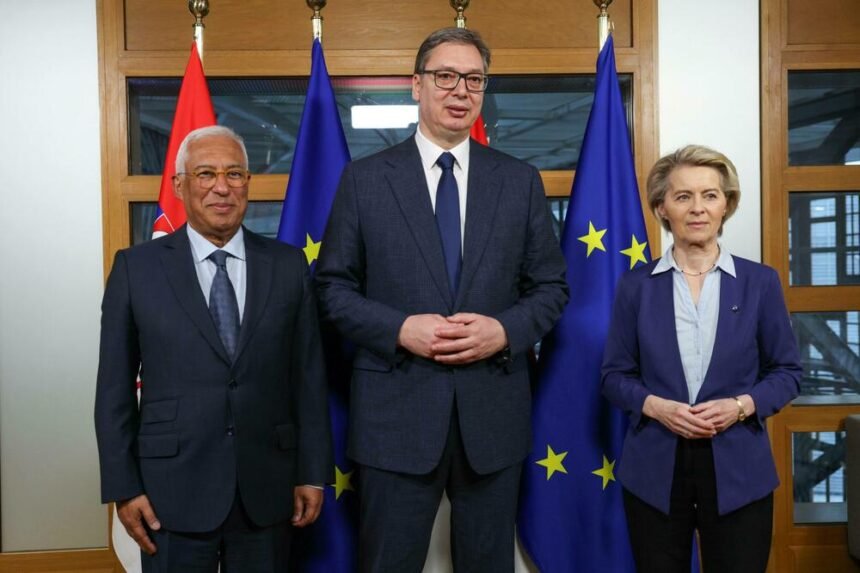The EU remains cautious in its approach toward Serbian President Aleksandar Vučić, avoiding criticism until it assesses that he will not survive the political crisis. Experts argue that Brussels lacks a clear alternative and prioritizes geopolitical stability over democratic concerns.
Key officials of the European Union are well aware of the problems posed by the Serbian government and President Aleksandar Vučić, but they will not criticize him unless they assess that he will not politically survive the crisis, stated Florian Bieber, a Southeast Europe expert and professor at the University of Graz, in an interview with “Vijesti.”
Commenting on Vučić’s recent meeting with top EU officials in Brussels, Bieber noted that while the public statements from European Commission President Ursula von der Leyen were relatively mild, indications suggest that Vučić received stronger messages behind closed doors.
Von der Leyen and European Council President Antonio Costa emphasized that Serbia’s future lies in the EU but also highlighted the need for progress in media freedom, anti-corruption measures, and electoral reforms.
Bieber asserts that there is no clear evidence that the EU has shifted its stance toward Serbia. “EU leaders are undoubtedly aware of the issues posed by Vučić’s administration, but they will not risk their relationship with him unless they conclude that he is unlikely to survive the current political turmoil,” he explained.
The EU remains reluctant to intervene in Serbia as it did in North Macedonia or other regions. When asked how Brussels views the ongoing protests in Serbia, Bieber noted that the EU is acting cautiously, fearing it might jeopardize its relationship with Vučić, known for his harsh reactions to criticism.
“The EU does not see a clear political alternative in Serbia, and it is currently less willing to engage in democracy and rule-of-law issues than it was a few years ago. Geopolitical priorities dominate its agenda,” he said.
Some within the EU prefer maintaining the status quo for economic reasons or fear the uncertainty that protests could bring.
After the working dinner in Brussels, Vučić stated that he was “very satisfied” with the discussions and believed the meeting was significant for Serbia’s future. He emphasized Serbia’s commitment to EU integration and hinted at upcoming decisions on forming a new government or holding new elections.
Despite this, criticism of the EU’s approach to Vučić has been mounting. Thirty members of the European Parliament recently urged von der Leyen to reconsider her meeting with Vučić, arguing that it sends a “concerning and harmful signal” given Serbia’s deep political crisis.
Former diplomat Srećko Đukić criticized the meeting as a “major masquerade,” asserting that Vučić benefited more than the EU. Meanwhile, MEP Gordan Bosanac noted that hosting Vučić amid Serbia’s crisis was “an embarrassment rather than an honor” and suggested that EU institutions are beginning to redefine their stance toward him.
Serbian citizens expect EU officials to publicly acknowledge democratic backsliding in Serbia rather than prioritizing political stability over democratic values, said Srđan Majstorović, chairman of the European Policy Center. “The people of Serbia deserve a clear message that the EU stands with them in their fight for democracy and the rule of law,” he concluded.







